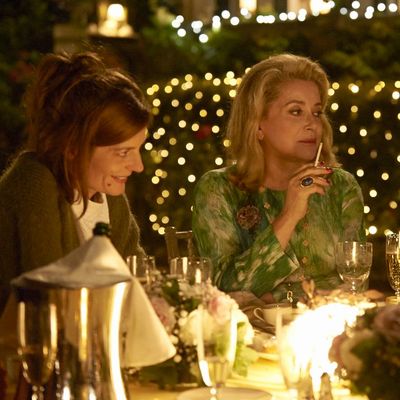
A romantic drama with the sensibility of a thriller, Beno├«t JacquotÔÇÖs┬á3 Hearts┬áis a good example of how a talented director and cast can elevate the most tired of concepts. The film finds meaning in its stylistic dissonances, right from the beginning. It opens with a man (Beno├«t Poelvoorde) missing a train back to Paris and making his way to a small caf├® by the station. He spies a woman (Charlotte Gainsbourg) who wanders into the caf├® briefly. He follows her out and strikes up a conversation with her. Meanwhile, the soundtrack blares dramatic blasts of noise; you might be forgiven for thinking youÔÇÖve wandered into an┬áInception┬áremake.
WhatÔÇÖs going on here? Beneath the casual (though not particularly realistic) dialogue, emotional tectonic plates are shifting. The man, Marc, is a tax inspector; the woman, Sylvie, co-owns a local antique shop; theyÔÇÖre not remarkable people, but something remarkable is happening to them. After a long night of walking and talking, theyÔÇÖre in love. SheÔÇÖs basically ready to leave her husband; he, after years of being single, thinks she might be the one. They decide to meet again in Paris. Braaaaaaaahhhm.
Their Paris liaison, however, is scuttled when Marc runs late with a business meeting and then, as heÔÇÖs rushing to their appointed spot at the Tuileries Gardens, blacks out at the wheel of his car. (No, really.) Thinking sheÔÇÖs been stood up, Sylvie returns home to the arms of her husband, and not long after, moves to Minneapolis for his job. Some time after that, Marc meets Sophie (Chiara Mastroianni), SylvieÔÇÖs sister, when she comes in for an unexpected audit. He doesnÔÇÖt know the two women are related; as he and Sophie strike up a quiet romance, he doesnÔÇÖt catch sight of Sylvie in the family photos on the wall. ItÔÇÖs only a matter of time, we know, before Marc or Sylvie realizes whatÔÇÖs happening, but the missed connections continue: Whenever one is about to catch sight of the other, something happens.
I know this all sounds ridiculous, and it is. Marc and SylvieÔÇÖs aborted get-together in Paris could have easily been saved by a text message or cell-phone call; romancing another person and not even showing a cursory interest in her family photos is pretty bad form; and presumably, sometime during their initial entire night of talking, what Sylvie does for a living might have come up. But 3 Hearts is in no way a realistic movie. Rather, it wants to express that heart-in-your-throat feeling of love, that sense that your entire life and happiness might hang in the balance of a missed connection, a stray wrong turn, a random and thoughtless decision. This might be why Marc always seems on the run, forever on the verge of a heart attack; maybe heÔÇÖs the one who truly understands the stakes.
This is a deceptively weird movie. ThereÔÇÖs always been an immediacy to JacquotÔÇÖs visual style; he likes to follow his characters closely, and he gets performances that are energetic but quiet. But here he adds a certain Hitchcockian elegance as well, as the camera cranes up and down and spaces accrue portentous meaning; that opening train station is presented like the setting of a great tragedy, while the Tuileries Gardens, the place of our loversÔÇÖ long-lost appointment, seem otherworldly, almost celestial. Meanwhile, the actors bridge the silly plot and the weighty style, creating a little network of need that gives their interactions urgency. PoelvoordeÔÇÖs frantic nervousness plays off against GainsbourgÔÇÖs more subdued veneer; we can sense how she might calm him. But the vulnerable Mastroianni needs him, too; if Sylvie helps Marc find his balance, then Marc helps Sophie find hers. We watch these people and we realize how much theyÔÇÖre bound to each other. It might seem dumb, but 3 Hearts knows exactly what itÔÇÖs doing.


